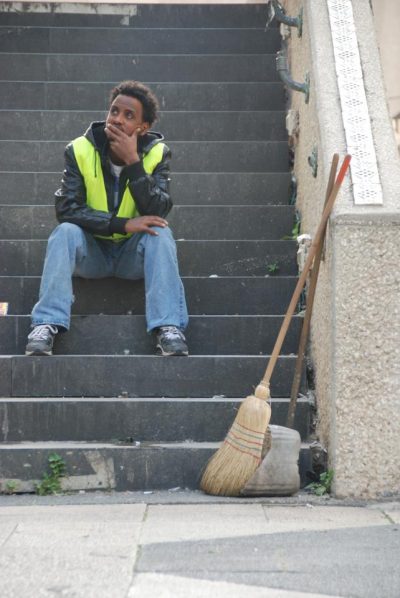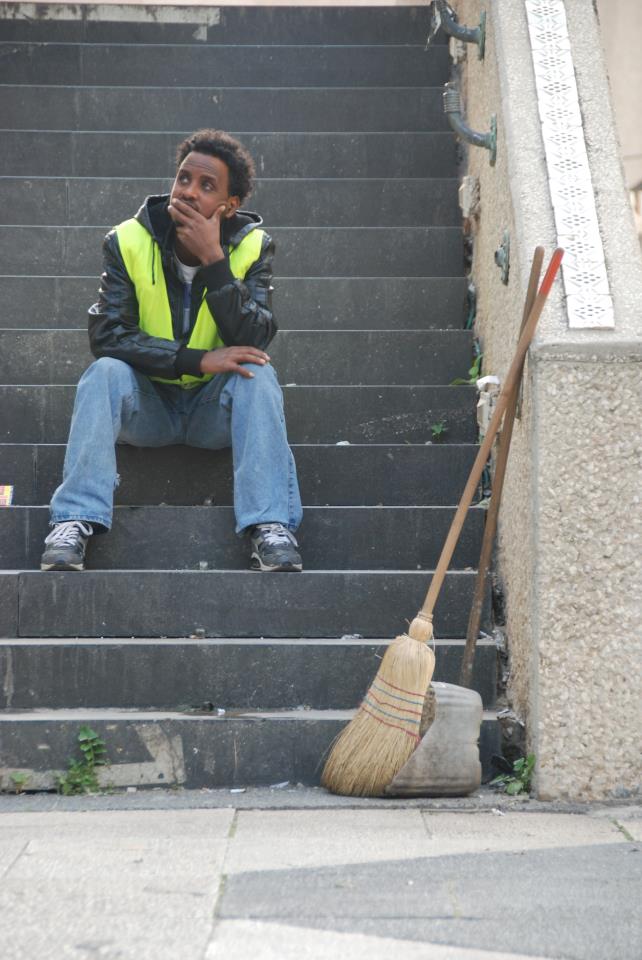
Yesterday afternoon, I sat on a park bench in my neighborhood, soaking up the sun. Dhana, a small Filipino girl made her way over to me, soccer ball tucked under her arm, dragging her mother by the wirst. When she reached the bench where I sat, she dropped the ball, threw her arms around me and planted a kiss on my cheek. After introducing me to her mother, she gave me another quick hug, and ran off, back to the playground to play with Geronimo, also from the school, an Argentinian boy who I often tutored in a mix of Spanish and Hebrew.
Dhana’s mother sat down on the bench next to me and took out a bag of spicy crackers and a bottle of Coke.
“Your daughter is a very sweet girl,” I told her in Hebrew.
“Yes, Dhana is good girl.” she replied, in English.
“I volunteered in Dhana’s class, teaching English.” I said, somewhat awkwardly. “I’m Koko.”
She smiled, and gave me her hand. “Rosa.”
It is very rare in life that you meet a stranger who is truly willing to open up to you. In fact, most of us in the Western world are told from a very young age to fear anyone we don’t know, or at least not to speak to them. We hold doors politely, ask for directions only if our smartphones fail us, and when forced to sit next to a stranger on the subway, do so with our gazes fixed stiffly forward. Our Halloween candy could be filled with razor blades or cocaine, because everyone we don’t know must be dangerous. Yes, we’ve got the other all figured out. We know their whole story.
But do we?
Rosa was born in the Philippines, to a family with a low social and economic standing. As the oldest daughter, she was expected to help take care of her siblings, and to bring in some additional income. Knowing that her family could never afford a university education for her anyway, Rosa dropped out of high school very early, and was married by age 16. Her husband, also from a poor family, was an angry and violent man, stingy and greedy. He beat Rosa frequently, and refused to agree to a divorce. Although she had two children to care for whom she loved dearly, Rosa wondered what else she had to live for. After attempting to take her own life, she came to understand that for the sake of her children as well as herself, she needed to get out. A younger sister had emigrated to Israel, and was now supporting herself as a maid for wealthy families in Tel Aviv. She sent word to Rosa, telling her of a life of independence, a life of relative prosperity and opportunity.
With the help of her sister, Rosa started to secretly save, hoping to acquire a visa and tickets for herself and her two children. She feared that her husband would discover her plan to escape, and hurt her. Eventually, he did find out and Rosa, desperate, spun him a tale of a wife gone abroad, sending money back to the Philippines to make her husband rich. Enticed by a promised life of wealth, her husband agreed.
By this time, Rosa’s visa had already come through, but she had been unable to procure ones for her children. Fearing that her husband would change his mind, she decided to leave for Israel straight away, rather than waiting out the whole application process again, and sneak her children in with her. Together with her daughters, Rosa boarded a plane and left her country and her parents behind for a country she had never visited, whose language she didn’t speak, with no guarantee of work or housing.
Rosa’s life in Israel was by no means easy, but when she arrived she was elated with her new sense of self-determination, after ten years of suffering at the hands of her cruel husband.
“I took revenge upon my old life,” she told me. “I went to discotheques. I put on lipstick, and I went to find a boyfriend.”
Rosa was, at first, happy. She was able to support herself through her work as a maid, cleaning for a Moroccan family. Because the family spoke only French, Rosa could communicate with them only through sign language.
“I would make a sign, do you want change clothes, you want eat? and she [the employer] tells me how to say it in French. So I learned. Now I speak English, French, Spanish, Hebrew and language of Philippines. For this I am very proud. I worked hard for it, so I am very proud.”
But immigration tracked her down. They found out that her children were illegal in the state, and told her that only her youngest daughter could stay. But because she was over 18, her older daughter must return to the Philippines immediately. When Rosa protested, explaining the situation back home, the official told her that unless she deported her daughter, she would lose her visa too.
“How can they tell me to make this choice?” She asked me. “They don’t understand what it is to be a mother. They make these rules from the brain, not from the heart. To be a mother is only of the heart. So what could I do? She stayed.”
As her daughter remained in the country, Rosa lost her visa.
Meanwhile, Rosa was also successful in her search for a new boyfriend, and she soon found herself with two more children, both girls. When her boyfriend cheated on her, Rosa was once again single, and now with four children. Immigration came around again, and this time, they demanded that her eldest daughter leave. Try though she might, Rosa could not dissuade the deportation officers, and her daughter was taken back to a country she had barely known. When her second daughter came of age, immigration sent her home too, and Rosa was left alone with her two youngest daughters.
“They warned me, the government, that if I leave, I can’t come back. I can only stay here now because I am the guardian of my two girls who were born here in Israel. When they turn 18, I will be illegal.”
When Rosa received word that her elderly parents were dying, she was heartbroken. She knew that their days were running out and was desperate to see them, but trapped on the other side of the globe, she had no way to return, to say goodbye.
“What could I do? I stayed, to make a life for my children, a life I never had. Things here are hard, but not like in the Philippines. Here I have job. Here I have money. I can do what I want. Now I have new boyfriend for four years, I live with him, and this time, he is a good man. I can yell at him. I can tell him what I want. I can tell him if maybe I’m sad. Not like with my first husband. I was a robot, you know?”
These days, Rosa still works as a maid, six days a week. She lives with her boyfriend, and her two children, about 10 and 7, who attend Biyalik-Rogozen.
“It is a good school there, you know. Good people. The children are from all over the world, and they learn that together they are just children. Person is person, and if you are Philippine, Arab, Ghana, so what it matters? I like the school because I can meet other mothers from Philippines. We can meet, and give our numbers, then we have who to speak to in our own language. Someone who understands the place we come from.”
Someone who understands the place we come from.
I asked her if she was happy, here, in Israel. Rosa sighed, and patted my hand.
“You are young. You have so much to see, to decide what you will do and want. I… hate my life. I have very, very hard life. Very long story. I only told you the surface. I try not to cry, only to laugh and smile. The past is past, and we can’t change this. Sometimes you see people, she is smiling, you don’t know that she smiles to cover her sadness. You see woman crying, but you don’t know why, you don’t what she has in her life. It is good to meet a person, to learn from them. Before I met you, you didn’t know about life in Philippines, I didn’t know Massachusetts is a place, I only heard it in a song. But now you know and now I know.”
Over the course of two hours, I was given a window into a life I had never before imagined. I certainly knew that the lives of migrant workers here are stories fraught with complexity, the stories of people coming here to seek a better life through hard, degrading work often, like Rosa, for the sake of their children. But giving a human voice to the concept makes it so much more real, so much more tangible, and makes me realize the assumptions I would have made if I had never spoken with her.
Just a small woman on a park bench, missing four teeth, wearing blue eyeliner and a white velvet scrunchy, so short that her feet, clad in stripy toe-socks and white flip-flops, dangle half a foot above the ground, munching quietly on Israeli snack-food, scattering crumbs for the birds. How many people do I pass on the street daily? Every single one of those people has a story, and here, in South Tel Aviv, a huge majority of them have an amazing, scary, complicated story like Rosa’s.
A few days ago on Humans of Tel Aviv, I saw a photo of a familiar sight in my neighborhood- a skinny Eritrean man in an yellow sanitation worker’s vest. The blurb beneath the photo told me that his name was Thomas, and that he was qualified as an engineer back in his country. I felt a heat rise to my cheeks as I looked at the photo of Thomas, sitting on stone steps, quoted saying “Self pity is not an option. one day I will look back at it and laugh.” I could have passed this man a hundred times, and I never would have guessed that he has an engineer’s degree. He is by far more educated than I am or my friends are, more qualified than many adults I know here, working in Tel Aviv, living in beautiful, spacious apartments, taking in generous salaries. I pride myself on my sympathy, my empathy for these people, for refugees, for migrant or contract workers. But who the hell am I to pity them? These people are stronger and more intelligent, more capable and certainly more experienced than I could ever dream to be. If within my lifetime I learn skills of survival half as good as theirs, I will be proud.
This, for me, is the end of an era. My program here at BINA is finishing up, and I am moving on to a few months of independence, of travel. But it’s also an end of an era of willful ignorance. These past months have opened my eyes to a new world, a world so different from the one I knew. I can never see my home the same way again, never spend money so frivolously, or eat a Thanksgiving meal guiltlessly again, and I wouldn’t want to. And after yesterday, I can’t look at a stranger the same way again. Who are we to walk around with our brains of conclusions and yet so empty of proof? We really have no idea who we are meeting.

